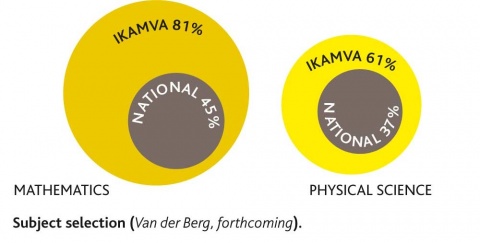
IkamvaYouth is pleased and proud to announce the publication of Against the odds: An evaluation of the IkamvaYouth programme, by a team of economists at the University of Stellenbosch. Servaas van der Berg and his team conducted an in-depth evaluation of IkamvaYouth, by administering questionnaires and interviewing 828 ikamvanites (past and present).
The full report is available here for download, and contains a wealth of information, results, analysis, quotes from ikamvanites and recommendations for improvements and scale.
Some of the findings have validated the results we’ve reported via our own tracking (see below). However, there were also some new and interesting findings, including:
- Insight into ikamvanites’ wealth and living standards
- Only 38% of ikamvanites live with their parents; 45% sometimes go to bed hungry; only 31% have their own desk or table at home and 65% have their own bed.
- 22% of mothers have matric and 11% have some post schooling
- 15% of fathers have matric and 9% have some post schooling; 32% of fathers’ education levels are unknown
- Matric results as compared with those of our feeder schools
- Detail regarding learners’ choosing Maths and Science and their performance in these most-challenging subjects
- “An overwhelming majority (81%) of Ikamva students in 2011 elected to do Mathematics, versus less than half of all candidates nationally. For Physical Science too, far more Ikamvanites chose this difficult option. Reponses to the survey indicate that similarly high proportion of former Ikamva students had elected these two subjects: 78% wrote Mathematics and 54% Physical Science.”
- “The difficulty of these subjects can be gauged from the fact that nationally, the pass rate (at 30%) is 46% and 53% for these two subjects respectively, much lower than for other electives such as Geography (70%) or History (76%), despite the fact that the candidates in these first two subjects are a far more select group in terms of academic ability. This ambitious subject choice is even more exceptional when compared to learners from similar (mainly township) schools. Ikamva’s encouragement of learners to take these more difficult subjects necessarily affects the relative pass rates and the subject performance of Ikamva learners negatively, thus the need to carefully consider this when evaluating Ikamva learners’ results.”
- “61% of all Ikamva matric candidates wrote and passed Mathematics, as against only 21% for all South African matric candidates.3 The proportion of all Ikamva matric candidates who achieved 40% or more was 28% versus 14% for all South African candidates. Compared to similar communities the Ikamva performance in this regard would even be more impressive than this.”
- ” What Ikamva thus successfully manages to do is to encourage learners from across the ability spectrum to raise the bar, by entering for subjects which the typical student from weak schools would usually avoid, and then to achieve success which is at least comparable to that achieved by candidates that often are more selected in terms of ability and from higher socio-economic groups. This is a truly impressive achievement.”
- The good results are consistent: “average results differ little between branches”
- The programme is very highly regarded by our learners and ex-learners (they do tell us these things, but it means a great deal more when told to independent evaluators)
- “The evaluation team is confident that Ikamva’s short term impact is considerable. This lies not only in the improved matric performance, but even before that in helping to create an environment where children from often very disadvantaged circumstances feel a sense of belonging and that someone cares about their needs and ambitions. That alone is a very valuable contribution. The extent of this contribution cannot be measured, but is visible in the fact that Ikamva was so highly praised by all who participates in it, or have done so in the past. As an evaluation team we have not seen such universally high praise of an organisation before.”
- Insight into the “success factors” behind the IY model
- “The remarkably successful personal relationships that Ikamva has developed with participants, based on extremely sensitive interaction with learners, yet without undermining basic discipline: “Kickouts” still occur and learners know that they can only remain part of the “family” if they play their part.”
- The tutors: “They are largely volunteers and mostly young. The fact that many of them are former Ikamvanites say something about the glue that holds Ikamva together: A positive social context in an environment where many face harsh circumstances at home, in the labour market, schools, universities, and wider society. The link with Ikamva means much to them, and also provides some continuity in their lives. Also, they act as role models to learners, thus further strengthening the desire of learners to undertake tertiary studies. Their relative youth also means that communication with learners is easier, in contrast to what learners experience at school. The team found no evidence that the tutors were particularly well trained or that they were always much better teachers than those in schools; the commitment, positive interaction and additional time were apparently most important in the success of students, not the better teaching.”
- “The fact that Ikamva operates in metropolitan environments where there are universities close by is an important factor in its success. Without a strong volunteer base, the tutors would not have been available, and it would have been more difficult to build the passion for tertiary studies that drives many Ikamvanites.”
- “The most important factors in Ikamva’s success, however, appear to be its commendable organisation, good planning and the enthusiasm of those at the head of the organisation. This enthusiasm is contagious.”
- Matric results
- “85% of Ikamva candidates passed, against the 70% nationally, or put differently, that Ikamva’s failure rate of 15% was half of the national average. But the full extent of Ikamva’s performance success is not yet captured in simple pass or fail rates: What is quite impressive is Ikamva’s performance in terms of getting learners access to universities: 36% of Ikamva candidates, versus 24% nationally, obtained a so-called “Bachelor’s degree endorsement”, i.e. a pass that is considered by the Department of Basic Education as good enough for degree studies. This is what used to be referred to in the past as “university exemption”. Data on a race basis is not yet available for 2011, but to put the Ikamva performance in terms of potential university entry in perspective, it is worth considering that the proportion of black students who obtained such exemptions in 2007, the last year for which race data could be obtained, was only around 11%. Altogether 72% of Ikamva candidates passed with either Bachelor’s or a Diploma endorsement, i.e. could potentially attend a university for degree or diploma studies (some universities have stricter entry criteria, though), whilst this proportion is only 53% amongst matric candidates nationally.”
- Placement into post-school opportunities
- More than half of respondents who had matriculated whilst participating in Ikamva after matriculating (58% of the 119 such respondents in the survey) indicated that they had gone onto university studies, and another 14% that they had continued onto “college” (here interpreted fairly broadly as other post-school studies). This thus left only 28% who had not gone on to further studies.
Key recommendations which we’re currently considering carefully include:
- Find ways to support learners as they adjust to life at tertiary
- “Ikamva could, and should, find ways of assisting students to make the transition to university, both by assistance with the initial exposure to academic English that many respondents to the qualitative interviews found daunting, and by helping them to find support structures to reduce the anomy that they experience when starting at university. Ikamva would have to decide how much of this it wants to engage in itself (which is not its core activity), and how much can be done by assisting Ikamvanites to link to other institutions (e.g. NGOs and university structures) that could assist.”
- Provide more support to build proficiency in Academic English
- Scale cautiously:
-
“Given how important Ikamva’s leadership is in its success, one may well argue that it would be extremely difficult to scale up the activities, particularly across many more centres. The evaluation team has indeed expressed its reservations about that in previous interaction with Ikamva: It is easy for leadership to under-estimate the importance of its own role. A dilution of this leadership across a much bigger organisation may lead to the programme losing some its attractiveness to students. On the other hand, analysis shows little difference in performance between branches. This could be interpreted as that the success lies in the model, and not in the particular leadership at branch level. This would be consistent with a view that expansion could be attempted as long as good branch leadership can be found. A cautious approach may be to consider expansion only when there are good support structures and where good branch managers are available, but not to be over-ambitious. The strong central leadership capacity that Ikamva possesses for planning and organisation is an asset that could be built on and that may offer a solid foundation for expansion, but it should not be endangered by too rapid expansion. Also, expansion should retain the essentials of the existing model, which importantly includes proximity to a university environment, preferably in a metropolitan area. This limits scalability, but such a conservative stance may be appropriate.”
IkamvaYouth is greatly appreciative to the Evaluation team (Nic Spaull, Ronelle Burger, Cobus Burger, Chris van Wyk, Servaas van der Berg, Robert Dzivakwi and the fieldworkers), ikamvanite Phillip Mcelu for tracking down 95% of all ikamvanites (!), DGMT for making this possible, and to all the ikamvanites who participated in the survey and interviews.

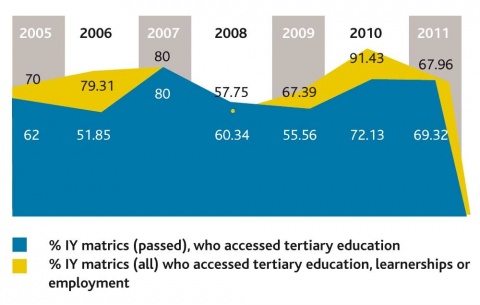
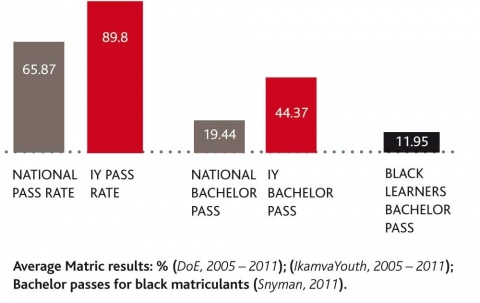
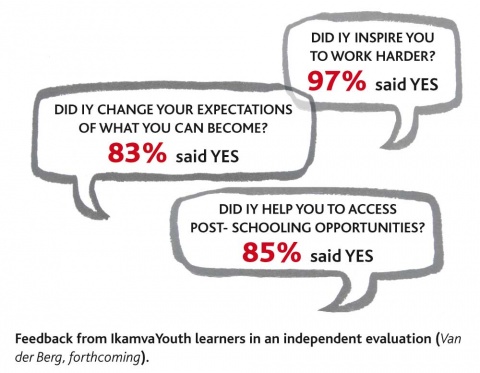
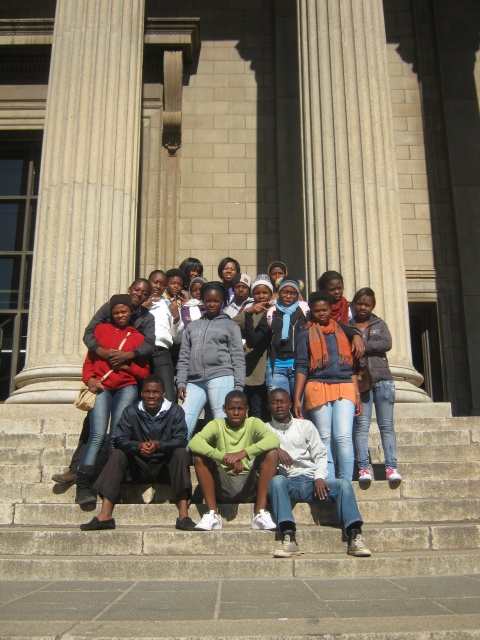
Learners from the class of 2011 have begun their journeys to ‘really bright futures’ and are paying-it-forward

Ivory Park outing to University of Wits 2011 – inspiring the leaders of tomorrow
I think I have a really bright future, thanks to everyone that has supported me… and myself!” Zintle Mtakati (Class of 2011, Masiphumelele Branch)
IkamvaYouth reported an 85% matric pass for its class of 2011 in January, but the organisation ultimately measures its impact in the number of learners who access post-school opportunities. 69% of IkamvaYouth’s matriculants have enrolled in tertiary education (including top institutions such as Wits, UFS and UCT), and overall, 97% of those who wrote the matric exams have accessed tertiary institutions, learnerships, employment, or are being supported to rewrite in 2012. 58% have transformed from beneficiaries into benefactors by becoming volunteer tutors and mentors for the next generations of learners.
The 2010 General Household Survey found that only 4,2% of South Africans aged 18 to 29 were enrolled at higher education institutions. Whereas 17,4% of white youth were enrolled at university, this was true for only 3,1% of black Africans and 3,5% of coloured persons (STATS SA, 2011). “The nation’s obsession with matric results is misplaced”, says IkamvaYouth director Joy Olivier. “It is only through access to post-school opportunities that the challenges of unemployment, poverty and inequality can begin to be addressed”. National coordinator Zamo Shongwe points out that “unfortunately, with the system struggling to deliver on the basics of literacy and numeracy, and most parents without the information or resources to assist their children, many young people are left stranded at this pivotal point in their lives”.
IkamvaYouth supports learners as they learn about, apply to, secure financial aid for, and enrol in universities, universities of technology, learnerships, internships and jobs. Every year since 2005 ikamvanites have achieved miraculous results, and once again, the low-cost / high-impact model’s effectiveness has been proven. Between 2005 and 2011, 66% of the programme’s 403 matriculants have enrolled in tertiary institutions. Overall, the peer-to-peer academic and social support system has ensured that 77% of matriculants since 2005 have enrolled in education, a learnership or a job 2.5 months following matriculation.
One ikamvanite who has been in the programme since 2009 has had to navigate a multitude of obstacles throughout her life including a lack of information, transport restrictions, and financial constraints. Her mother is HIV positive, works as a domestic worker and has brought her daughter up on her own. Now, she is studying for a BA in Human and Societal Dynamics at the University of the Free State on a full academic bursary, awarded by Jonathan Jansen.
The hard-working branch staff, volunteer tutors and mentors inspire and equip their learners to dramatically change the course of their lives. Two branches (Masiphumelele and Nyanga) had grade 12s for the first time, and their results are further evidence of the replicability of the model. The branches’ 2011 placement results are:
|
|
% matriculants accessing tertiary
|
% matrics overall who are writing supps/rewriting or accessing tertiary, learnerships, employment or rewriting
|
|
Makhaza
|
82%
|
100%
|
|
Nyanga
|
71%
|
100%
|
|
Masiphumelele
|
41%
|
100%
|
|
Chesterville
|
78%
|
95%
|
|
Ebony Park
|
82%
|
87%
|
Anathi Malindi, a Grade 12 from the Nyanga Branch, achieved a Bachelor pass in her exams and is now studying Analytical Chemistry at CPUT. Her mother was “so relieved and happy that her future is brighter now”. The majority of ikamvanites come from homes where one basic income supports an entire family, where unemployment, alcoholism and domestic violence are the norm, and access to university has hitherto been an idealised pipe dream. For ikamvanites it is becoming a reality. 83% of Ikamvanites surveyed in 2011 stated that IkamvaYouth had changed their expectations of what they could become. The fostering of self-belief and the support offered to learners truly allows them to proclaim that “today my life begins” (Anathi Malindi).
Placing learners at the centre of programme design and delivery ensures a lasting impact. Vuyiseka Melani, from the Nyanga branch, says “it’s not just the tutoring that makes us attend Ikamva, but the support and the love we receive from all the tutors”. IkamvaYouth works with learners in grades 8 to 12 to ensure that they do not become part of the growing cohort of unemployed and uneducated youth. As each matriculating year exceeds their own and others’ expectations, more are inspired to become volunteer tutors themselves. The organisation’s consistently impressive track record has attracted new supporters, staff and volunteers, enabling the organisation to establish two new branches (Ivory Park in Gauteng and Umlazi in KZN) and enroll 711 learners across the country in 2012.
The ikamvanites are inspirational examples of young people becoming agents of their own change and the architects of their own futures. The organisation is calling out to anyone and everyone to join and enable further success breeding success. Join us and lift as you rise!

Over 320 abstracts were submitted to the SA Basic Education Conference from teachers, principals, academics, government, non-government organisations, and the corporate sector, and IkamvaYouth’s submission has been selected as a poster presentation on 2 April. Zamo Shongwe and Joy Olivier will be representing the ikamvanites at this event, and are looking forward to learning, sharing and connecting with the conference delegates from all sectors. Professor Metcalfe, the conference chair, said that “it is very encouraging to see the creative and innovative ideas coming from teachers and principals at the coal-face of basic education”, and we’re looking forward to being a part of it.
IkamvaYouth’s poster presentation will be uploaded here in the coming days, together with background information, references and acknowledgements. We hope that readers will engage with it and send us your comments and questions via the facebook comment functionality below.


One of Makhaza’s tutors was lucky enough to be involved with Dance4Life and RedZebra Foundation which uses creative facilitation techniques, dialogue tools, bottom up processes as well as music and rhythm to deliver powerful experiences for the young people. The approach is youth friendly and centered around the notion that
Dance for life is a dynamic international initiative that involves young people; it encourages them to use their voices in stopping the further spread of HIV/AIDS and breaking down the stigma and taboos that surround the pandemic. Its approach covers all aspects of popular youth culture: media, language, icons music and especially dance. Dance is a universal language and through Dance4life young people dance with a cause. During the Schools4Life project (visiting schools and run workshops), which is the heart of the concept, they acquire the knowledge and life skills they need to protect themselves, while motivated to inform their peers and take action to improve young people reproduction health and rights.
By involving youth, it’s possible to change not only their behavior but also to mobilize them to create social change in their communities so that others change their behavior and perceptions as well. Dance4Life strives to empower young people to unleash their leadership potential, including young people living with HIV.
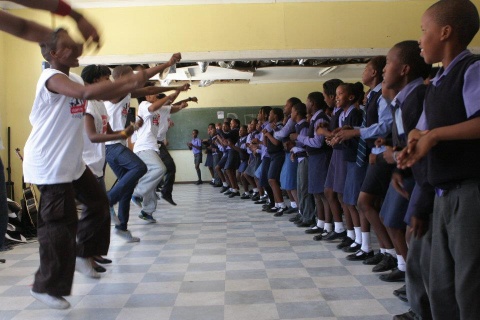
Ayanda Sawulisi, a past IkamvaYouth learner at the Makhaza branch, now a committed tutor participated for the week’s training and has this to say, ‘Well I got involve in the Dance4life project via Ikamva Youth. I got interested in the program because I love to work with young people and being the person that I am who is involved in the entertainment industry, I believe that I can use my skills and elevate dance4life project to new heights.
I also joined because Dance4life’s tool of getting the message across is very unique and inclusive ways though dance, music, spoken word etc which are my areas of interest. The training was great; it was very informative in terms of leadership skills and how to run workshops. It was full of energy, skills exchanging and creativity. Most of all I enjoyed to learn the dance which was the core element of the program and I was blessed to be amongst individuals who are very talented and who are in the virtue of becoming young leaders. The dance will help me in a way that I will be able to teach others but most of all to teach them the message behind the dance and it also help in terms of fitness/health because you sweat very much!’
Big up to Peter Schaupp and RedZebra Foundation for the opportunity!
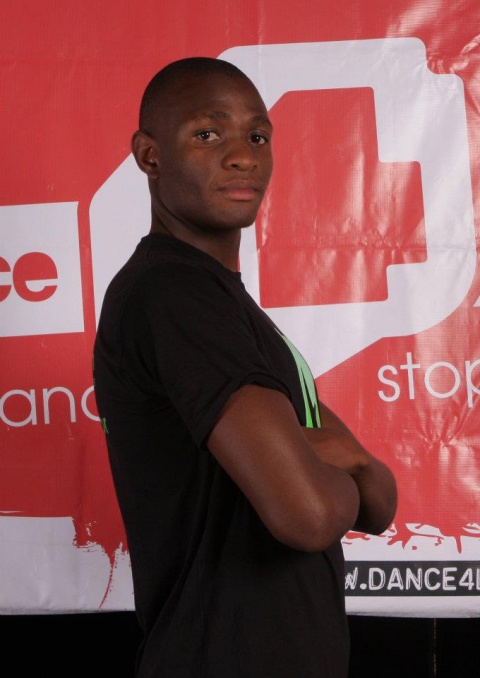
![From Cape Town to the University of Free State…]()
Cape Town Bus station on Saturday the 28th of January at 6.00, 4 excited students left the Mother City to join the University of Free State in Bloemfontein.

From left to the right: Buhle Mashiyi is starting a 5 year Bachelor of Law, Zintle Mtakati has been enrolled for a Baccalaureus of Social Sciences Extended programme in Human and Societal Dynamics, Cebisa Mtyhobile is studying a Bachelor of Social Sciences in Social Work and Simphiwe Simo enrolled for the Baccalaureus degree in Social sciences in Nursing.
The first 2 students, Zintle and Buhle, has been part of the programme since 2008 and concretise their dreams in studying Social sciences and Law. Cebisa and Simphiwe have been previously selected and interviewed by Masiphumelele Corporation to access a bursary.
None of this would have happened if Professor Jonathan Jansen, Vice-Chancellor of the University of Free State, hadn’t promised to accommodate 4 students with full-bursaries. All the IkamvaYouth team is very grateful. Thank you very much for these awesome opportunities.
We look forward to all four of you reaching your career goals, thanks to studying at UFS. You make us feel proud!

The Makhaza Branch on IkamvaYouth has started the year sprinting! This year we have grown staggeringly to over 200 people with 170 learners and over 30 tutors, extending tutoring times to every day of the week including weekends!
Already the new year has begun with some exciting projects, Khan Academy is in full swing with two Grade 9 groups participating, as well as the programme being extended to grades 10 and 11. Education Without Borders ‘Yes We Can’ maths project has also begun with the new group of grade 8s. We expect the same incredible successes as last year. English programmes have also been implemented at the younger grade levels, as well as regular tutoring and mentoring for the older grades.
Matrics have begun their year with sessions identifying where they would like to be shadowing tutors in their classes later in the year as well as which institutions they’d like to come chat with them about their options. Last year’s matrics are also in the process of being places in various institutions and making sure no one is left behind this year.
Last Saturday we had our first parents meeting of 2012 with an amazing turnout, the hall was packed to capacity where there was a distinct feeling of excitement and hope for the year to come. Of all the students who made it in 4 were turned away, and waiting lists are at an all time high.
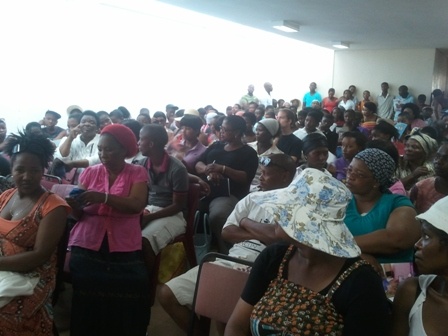
Meeting the parents
We also have two new interns helping us out with tutoring, admin work and setting up databases for the new students. Claire Fisher and Tumisang Madigele are both currently attending the Stanford University study abroad program in Cape Town for their winter term and volunteering at IkamvaYouth.
“Hi! My name is Claire Fisher, and I am from San Francisco, California in the United States. I am a third year student at Stanford University studying political science with concentrations in political theory and American politics.
I am also very passionate about education reform, but my academic and experiential background pertains mostly to education in the United States. I am taking a class here on schooling and education policy in South Africa, so hopefully that will give me a better understanding of the context. I am excited to work at IkamvaYouth to learn more about education in a hands-on way, and I love tutoring, especially in algebra, English, and history! I am already impressed by IkamvaYouth’s incredible reputation, success rates, and mobilization of its students to return to the organization. I also am a huge fan of Khan Academy and am inspired by its ability to use technology to broaden access to quality lesson plans, and so the fact that Ikamvanites use it is amazing.
I wanted to come to Cape Town because of its urban cityscape and beautiful mountains, and I find the cultural complexity of the city due to its historical legacy both challenging and fascinating.
Thanks for having me, IkamvaYouth!”
And Tumisang says, “Hi, my name is Tumisang Madigele and I am from Botswana. I am doing my third year in International Relations at Stanford University. I am interested in working within African communities, especially with organizations whose goal is to empower youth. I am excited to be tutoring kids and helping out at Ikamva. It’s great to work with motivated youth!”

Tumisang and Claire
We are also calling for more tutors this year. Tutoring schedules are as follows:
Grade 8&9 – Monday and Wednesday 3:30pm-5:30pm, and Saturday 9-1pm
Grade 10-12 – Tuesday and Thursday 3:30pm-5:30pm, and Saturday 9-1pm
If you are interested please email Liesel:
liesel@ikamvayouth.org
079 885 4372
Good luck all our Makhaza Ikamvanites!
















 Lloyd Lungu
Lloyd Lungu